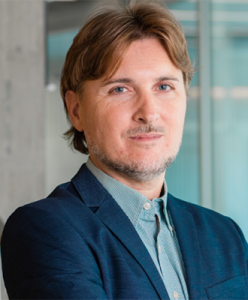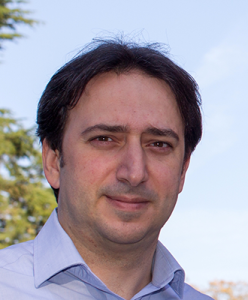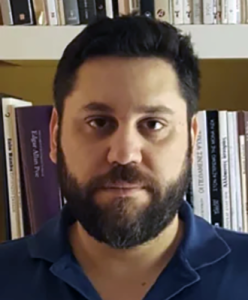Keynote Speakers
Prof. Francesco Flammini
University of Applied Sciences and Arts of Southern Switzerland (CH)
Department of Innovative Technologies
Digital twins for trustworthy autonomy
The concept of risk combines threat probabilities, vulnerabilities, and expected consequences. Traditional risk modelling evaluates these at design time and may repeat periodically, but it cannot account for how risk evolves with actual system states or detected threats. In connected cyber-physical systems (CPS) and the Internet of Things (IoT), a key challenge is enhancing resilience through mechanisms for real-time threat detection, risk estimation, and system reconfiguration, following Self-X principles like self-diagnostics and self-healing. Threats can be intentional (e.g., security attacks) or unintentional (e.g., random faults). A major goal is to develop model-based approaches that enable runtime risk evaluation, considering uncertainties in both the system and its environment. These models should address the growing complexity and criticality of modern CPS. Multi-paradigm modelling combines probabilistic languages like Bayesian Networks with formalisms such as Petri Nets to balance ease of use, expressiveness, and solving efficiency. Static models used for design-time risk assessment can be integrated for online monitoring, threat detection, and dynamic adaptation. Reusing models from system certification, coupled with runtime model-checking, supports explainable AI (XAI), crucial for building trustworthy autonomous CPS like self-driving vehicles. Digital Twins (DT) are emerging as a promising paradigm for runtime modelling and performance prediction in CPS across various domains. This talk introduces a framework that merges DT with self-adaptation, enabling CPS to self-monitor, self-diagnose, and self-heal, promoting proactive dependability and collaborative security in critical applications such as smart cities and Industry 4.0.
Biography
Francesco Flammini graduated cum laude (M.D., 2003) and got a research doctorate (PhD, 2006), both in Computer Engineering, from the University of Naples Federico II, Italy. Since 2003, he has been a chartered engineer, and has worked for 15+ years in industry, including Ansaldo STS (now Hitachi Rail) and IPZS (Italian State Mint and Polygraphic Institute), on large international projects addressing safe and intelligent transportation, critical infrastructure protection, and cybersecurity, as a technical leader and unit head. Since 2017, he has been a Senior Lecturer and the chair of the Cyber-Physical Systems (CPS) environment at the Department of Computer Science and Media Technology of Linnaeus University (Sweden). Since 2020, he has been a Full Professor of Computer Science with a focus on Cyber-Physical Systems at the School of Innovation, Design and Engineering of Mälardalen University (Sweden). He is now a Full Professor at the Department of Mathematics and Computer Science Ulisse Dini of the University of Florence (Italy), where he is a member of the Resilient Computing Lab (RCL). He is also a Professor of Trustworthy Autonomous Systems at the University of Applied Sciences and Arts of Southern Switzerland, where he is affiliated with Dalle Molle Institute for Artificial Intelligence (IDSIA), and leads the Trustworthy Autonomous Systems (TAS) research group. He is a Senior Member of the IEEE, an IEEE Distinguished Visitor, an ACM Distinguished Speaker, and a Member of the IEEE SMC Society Board of Governors as Associate Vice President for Members and Student Activities (MSA). He is also the chair of the IEEE SMC Technical Committee on Homeland Security. He has (co)authored 150+ scientific publications, and he has served as a chair, invited speaker, steering/program committee member, and editor for several international conferences and journals, including International Journal of Critical Infrastructure Protection (Elsevier) and IEEE Transactions on Emerging Topics in Computing. He has been the principal investigator and technical manager of several national and international projects, mainly funded by the European Commission, where he also serves as an expert evaluator and project reviewer. He has been the recipient of several international awards, including the Dalle Molle Award for the Quality of Life Label (2024), and the TRA Visions Senior Researcher Award (2024).
Prof. Konstantinos Markantonakis
Royal Holloway University of London (UK)
Department of Information Security
Unifying security: How trusted execution environments secure AI on the edge and the battle against side-channel attacks
Trusted Execution Environments (TEEs) have become a critical component in modern secure computing, addressing challenges across various domains, including side-channel attack mitigation, high-performance computing with GPUs, and AI security at the edge. This keynote provides a comprehensive overview of TEEs, highlighting their role in confidential computing, secure AI workloads, and protection against side-channel exploits. We will explore how TEEs safeguard sensitive operations against timing, power, and cache-based attacks, examine their integration into GPU-based architectures for high-performance security, and discuss their application in AI inference at the edge, ensuring data privacy, model integrity, and compliance with regulatory frameworks. Additionally, we will compare leading TEE implementations to assess their security and performance trade-offs. This presentation will also cover industry use cases, including autonomous vehicles, medical AI, and industrial IoT, followed by a discussion on future challenges, standardisation efforts, and emerging security threats. Attendees will gain a holistic understanding of the evolving TEE landscape and its critical role in securing next-generation computing environments.
Biography
Konstantinos Markantonakis B.Sc. M.Sc., MBA, Ph.D., received his BSc in Computer Science from Lancaster University, his MSc in Information Security, his PhD and his MBA in International Management from Royal Holloway, University of London. He is currently a Professor of Information Security in the Information Security Department in Royal Holloway University of London. He is also the Director of the Information Security Group Smart Card and IoT Security Centre (SCC) and the Director of the Transformative Digital Technologies, Security and Society Catalyst. His main research interests include smart card and mobile device security and applications, IoT, embedded system security, distributed ledger and smart contracts, trusted execution environments, payment systems, automotive and avionics system security. He has published more than 220 papers in international conferences and journals. He has served as invited speaker, chair, steering and program committee member, and editor for several international conferences and journals. His research has attracted funding from competitive UK/EU funding sources but also from the industry, and he has led into completion several funded projects. He is a co-inventor in two patent applications and has successfully commercialised a project idea with a couple more in the pipeline. He has received a few awards including the International Federation for Information Processing (IFIP) Service Award, and also best paper awards. He is the chair of IFIP WG 11.2 Pervasive Systems Security. He has experience in commercialisation of cyber security ideas and products, and he has acted as experienced consultant for several key technology companies.
Prof. Constantinos Patsakis
University of Piraeus (GR)
Department of Informatics
Adversarial bypasses on detection engines, from code to binaries
The continuous arms race between threat actors and defenders has significantly raised the bar for both sides, resulting in highly sophisticated measures from both sides. This talk will look at the problem from the perspective of the adversary and discuss methods to bypass static analysis of both code and binaries. While not as thorough as dynamic analysis, static methods, due to their efficiency and low requirements for resources, are the first line of defence. Therefore, breaching them implies that the adversary can establish a foothold in the targeted organisation. To this end, we will discuss insider threats, i.e., how one could masquerade vulnerable code to bypass state of the art SAST pipelines, but also bypasses to AI-based methods to detect malware. These attacks try to shed light on the balance that defenders need to strike between strict rules and automated AI methods, but also the need to dive deep into the data and understand the complexities and interdependencies.
Biography
Constantinos Patsakis is a professor at the Department of Informatics, University of Piraeus and an adjunct researcher at the Institute for the Management of Information Systems (IMIS) of Athena Research and Innovation Centre. He holds a BSc in Mathematics from the University of Athens, Greece, and an M.Sc. in Information Security from Royal Holloway, University of London. He obtained a PhD in Security from the Department of Informatics of the University of Piraeus. His main areas of research include cryptography, security, privacy and cybercrime. In the past, he has worked as a researcher at the UNESCO Chair in Data Privacy at the Rovira i Virgili University of Tarragona, Catalonia, Spain, Trinity College, Dublin, Ireland, and the Luxembourg Institute of Science and Technology.



